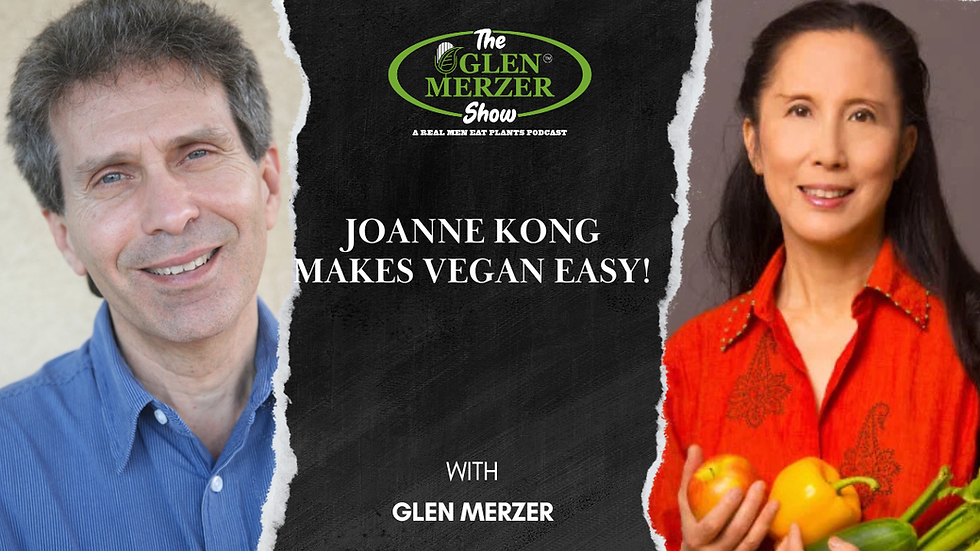YOU ARE WHAT YOU EAT—A TWIN EXPERIMENT
- Glen Merzer

- Jan 12, 2024
- 3 min read

Netflix is presenting the four-part documentary “You Are What You Eat—A Twin Experiment,” funded by the Vogt Foundation, a San Francisco-based organization that promotes plant-based
development and assists animal protection causes. Christopher Gardner, who describes himself as a practitioner of a plant-based diet and a vegetarian (but does not call himself a vegan) designed the
experiment that the series tracks, in which twenty-two sets of identical twins were followed over eight weeks. In each set, one twin practiced an omnivorous diet and the other followed a vegan diet. They were assigned their respective diets in a seemingly random manner, and sometimes in contradiction of their own wishes. Both diets were devoid of junk foods and were described as “healthy.”
Bloodwork and scans of body fat were taken at baseline, as the experiment began, and then
were reported after eight weeks. In the documentary, tracking of the health study alternates with other narratives whose themes support a transition to plant-based living: the story of individuals whose health was destroyed by their proximity to hog operations; the story of Eleven Madison Park, the pricey, elegant, 3-star Michelin NYC restaurant that went vegan following the crisis of conscience of Chef Daniel Humm; the story of a chicken farmer who gratefully evolves into a mushroom farmer. These ancillary stories were, for me, more compelling than the suspenseless nutritional experiment at the heart of the four-part series, as the experiment’s results were a foregone conclusion. Critics of the documentary would argue that those results were a foregone conclusion because of the Gardner’s vegetarian bias; I would point instead to seventy-five years of nutritional studies that almost uniformly point to the superiority of plant-based nutrition.
As a vegan advocate, it’s hard for me not to like “You Are What You Eat,” since I support its
conclusions. All the same, Gardner would have done himself, and his series, a service if he had at least made some overtures towards evenhandedness. Why not have a Paleo advocate involved either from the get-go, in the study design, or at least along the way, reviewing the results and commenting on the ancillary stories? I would love to hear, for example, the Paleo advocate Gary Taubes respond to the environmental reporting in the film; I suspect that he would have to acknowledge that a plant-based diet is far more climate-friendly than the diet he advocates, and such an acknowledgment would carry
more weight coming from Taubes than from, say, Patrick Brown, the founder of Impossible Foods, whose presence in the film made it feel a bit like a commercial at times. There are other consequences of the film’s bias: a misbegotten attempt to show improved sexual stimulation in a woman practicing a vegan diet, as compared to her twin sister, fell terribly flat.
The film seemed to be making the case, in fact, for a diet based around foods like those offered by Impossible Foods—foods that are vegan, regardless of how processed they may be. Some visuals showed olive oil being triumphantly poured over salads, as if that represented a health benefit. And so the dietary study and its conclusions were sub-optimal.
The identical twin framing of the study made for compelling visuals, and perhaps disarmed
those skeptics who believe that health is determined mostly by genes, but the reality is that most compelling data in the health study was not the comparison of twin versus twin, but rather the comparison between each individual after eight weeks of eating according to the protocol versus his or her baseline. That’s where the vegan eaters achieved a greater loss of visceral fat, greater improvement of blood pressure, and better results on a wide variety of health metrics, though the full data was not meaningfully presented.
“You Are What You Eat—A Twin Experiment” is a vegan-friendly documentary that is well-worth seeing. But it missed an opportunity to make a convincing case to skeptics of the plant-based diet.




Comments